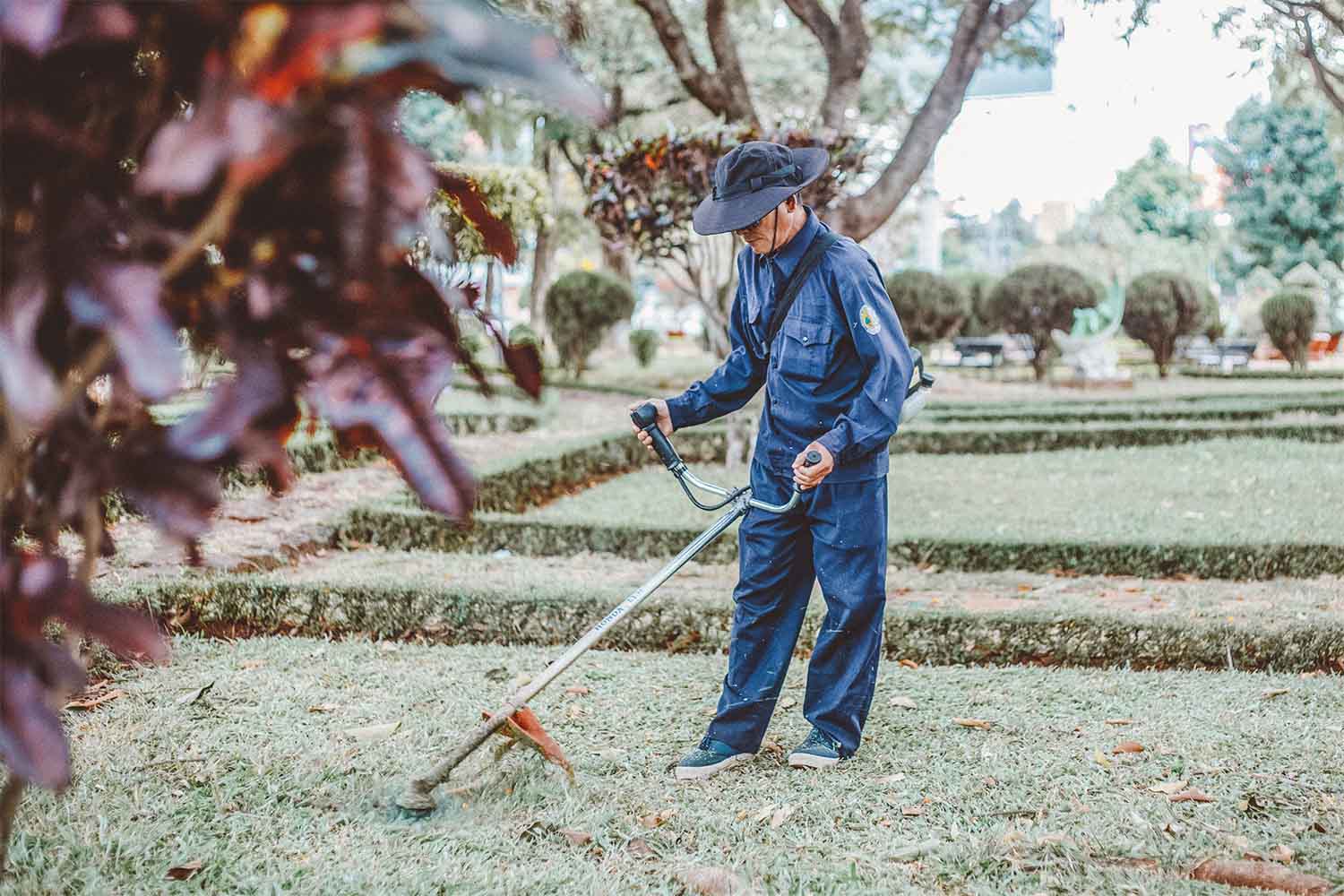18 Landscaping Tools Every Landscaper Needs + Where to Get Them

Work becomes exponentially harder without the right tools. Technically, it is possible to do a job like mowing the yard with a good team and sturdy shears—but using a lawnmower makes the work much easier. Using the right equipment makes landscapers more efficient, allowing business owners to serve more clients and increase profits.
In this guide, we’ll provide a thorough overview of the tools you need for a successful landscaping business, the qualities to look for in those tools, and where you can shop for them.
Jump to the section that most interests you:
- 18 Tools Every Landscaper Needs
- Where to Get The Best Prices for Landscapers Tools
- Boost the Efficiency and Profitability of Your Landscaping Business With OptimoRoute
18 Tools Every Landscaper Needs
Whether you’re looking to start a new landscaping business or grow your existing company, you’ll need a variety of tools to get the job done. This includes hand tools and electric tools to do essential lawn care tasks like mowing lawns and removing unwanted shrubs. You’ll also need technology to help keep your business running smoothly. In this section, we’ll outline the specific landscaping equipment you need and what to look for when shopping.
Hand Tools
As the name implies, hand tools are those you hold in your hand to complete a variety of tasks, such as a hammer or spade. Commonly used by individuals as household gardening tools, they’re essential for your landscaping business due to their versatility. Manual tools also allow you to work with precision, like when you need to trim a shrub or plant tulips in the specific places you want them.
Depending on the specific landscaping services you offer, you may need specialized tools like a fruit picker to care for an orchard or a hand cultivator to break up the soil. Regardless of the niche services you provide, there are a few essential tools your business cannot function without.
- Lawn Aerator: Lawn aerators can be manual or electric and are designed to break up the soil, relieving compaction and allowing water and nutrients to reach roots that may be buried deep underground. When shopping, look for an aerator that will drill a few inches into the ground to relieve the most compaction.
- Tamper: In contrast to an aerator, this tool is designed to tightly pack materials like sand, dirt, or concrete by “tamping” down on them. Manual tampers are most commonly used by landscapers and should have a strong handle and durable frame as they repeatedly strike a material until it is compacted.
- Rake: A rake is essential because it helps to sweep up bits of plant material, gather dirt, and scrape or move anything else you may encounter on the job. Consider factors like the length of the handle, the material the rake is made from, and the materials you need the rake to move. Based on this, you can select the rake best for your needs, such as a leaf rake for gathering leaves in autumn. Or you can buy multiple rakes to prepare for unforeseen task you may need to complete.
- Shovel: Shovels help dig into the soil, break up clods of dirt, and scoop materials like pine needles or gravel. Buy a shovel light enough for you to handle with ease but sturdy enough to withstand difficult tasks like digging into dry, compacted ground.
- Spade: Often confused with shovels, spades have a square base and are designed to sweep and scrape hard surfaces like concrete. Look for a spade with an easy-to-grip handle and made of metal to withstand tough jobs like moving gravel or concrete.
- Trowel: Trowels are used as shovels for jobs where a shovel is simply too big, such as creating a small hole to plant a seed in a flower bed or prying stones up from the soil. Look for a durable trowel with a comfortable grip that will allow you to complete difficult tasks.
- Shears: A kind of industrial scissors for your garden, shears cut through small branches and stems to help you shape hedges and trim bushes. Shop for shears in person so you can feel which ones have a good grip and open and close with ease. It’s also important for the shears to have a latch so they stay closed when not in use to prevent injury.
- Lopper: Similar to shears, loppers cut through branches and stems and are fittingly referred to as “pruners.” Loppers differ from shears by having a long handle to help you reach into trees to prune the branches. Consider the type of trees you’ll need to cut, then assess the lopper’s cutting mechanism, safety features, and reach to determine if it’ll work for your needs. Be sure to check the weight and grip to guarantee you’ll be able to physically handle the tool.
- Wheelbarrow: Wheelbarrows are versatile tools that allow you to transport materials with ease. To select a wheelbarrow, consider factors like what the wheelbarrow is made from, how many wheels it has, and what type of terrain you’ll need it to navigate.
Individual tools may be affordable, but they can add up quickly if you’re buying in bulk, so be sure to keep your budget in mind while shopping.
Electric Tools
Electric tools, often called power tools, are operated by electricity and complete tasks that are difficult to do with hand tools, such as cutting through tree trunks or mowing a large lawn. Historically, many of these tools were gas-operated. However, as technology advanced, gas-operated tools have increasingly been traded for their electric counterparts, which can have long battery lives and are quieter than gas-powered motors.
When you shop for electric tools, it’s important to look at whether they run on a battery or if they need to be plugged into a power source. Tools that need to be connected to a power source may limit your range but will run nonstop without changing batteries. Battery-powered tools may require you to recharge batteries and change them frequently, so be sure to look at the duration of battery life when shopping for these tools.
- Chainsaw: Cordless chainsaws are mobile and allow you to quickly complete tasks like cutting through branches, making them ideal for mobile businesses like landscaping. When shopping for one, it’s important to evaluate weight and battery life, and it’s also vital to look for a chainsaw with safety features to prevent accidents. Due to how loud they are, it’s also worthwhile to invest in ear protection for the landscapers who will use this machinery.
- Mower: Lawnmowers are a costly investment, and due to their size, they can be difficult to transport. Buy a mower you can realistically transport from job site to job site. Many lawnmowers come with additional features that can help by doing some of the cleanup work for you, such as mulching or bagging clippings.
- Trimmer: Commonly called a “weed-eater“ or “weed-whacker,” these precision tools trim the areas a lawnmower can’t reach. They rely on plastic string blades to cut plant material, so look for a trimmer that’ll be easy to reload when it’s time to change out the string. It’s also worthwhile to look for a string trimmer with low vibrations to make precision trims easier.
- Leaf blower: You can use a leaf blower to quickly move leaves and other plant material into a big pile. This tool relies on forced air to move leaves, so look for a blower with a high mph output and a large cubic-feet-per-minute range, as this will inform how effective the machinery is.
Don’t Forget Software
Software keeps operations running smoothly for landscaping businesses by automating key tasks like payroll and route planning and allowing you to focus on more important tasks that can’t be automated, like choosing plants for a garden bed. However, it’s important that you implement software that fits your business needs, or you may end up paying for additional features you don’t need. To do this, look for software designed for businesses of your size and provides access to support resources in case you need help. Because you might not have access to a computer when you’re on the job, you should also look for software that is cloud-based and offers mobile capabilities, so you can access the system even when you aren’t in the office.
- Lawn Care Apps: These systems are designed specifically to help landscapers work on various properties by measuring plots of land, calculating fertilizer ratios, and identifying plants with the help of a camera. For example, Lawn Journal is a free app that allows users to track landscaping properties, measure areas of a yard, and take notes that include photos.
- Routing and Scheduling Software: Routing software is essential for mobile landscaping businesses because it plans optimized routes that allow landscapers to complete more jobs by cutting down on travel time. Search for a scalable system that meets the needs of your seasonal business, which may have drastically different customer demands from season to season.
- Customer Relationship Management System: A CRM will help your business grow by fostering and maintaining customer relationships by sending automated follow-ups and scheduled marketing emails so you don’t have to. Look for a CRM that can support a large number of emails, or you may have to pay for upgrades if the platform can’t meet your needs.
- Weather Apps: A reliable weather app will provide invaluable information that can help you plan jobs. After all, it’s difficult to prune a tree or mow a lawn during a thunderstorm. A reliable weather app will be able to forecast at least one week into the future, so you’ll be prepared for whatever Mother Nature throws your way.
- Invoicing Software: You need to ensure customers pay you in order to pay employees and keep the business running. Invoicing software can automate this by tracking important documents, generating invoices, and automatically sending payment reminders to customers.

Where to Get the Best Prices For Landscapers Tools
You can buy most of the tools we’ve listed at any local hardware store or garden center. However, it’s important to make sure you buy high-quality tools wherever you shop. Shopping at businesses that offer discounts or extra perks for business buyers is one way to ensure you can get the tools you need for an affordable price.
Local Hardware Stores
There may be a mom-and-pop hardware store in your area where you can find great prices on all the tools you need. If not, shopping from larger stores like Lowes or Home Depot can be just as convenient.
Home Depot is a convenient location to purchase tools in North America because it has a wide selection of tools. It’s also a large chain that has multiple stores in most cities. This allows landscapers to find the location closest to them and shop at their own convenience. Apart from the convenience, Home Depot also offers a few different credit cards, including commercial credit cards specifically for business owners. These credit cards allow landscapers to buy the tools they need and pay for them in smaller, more affordable chunks. Credit card programs also come with additional benefits like purchase tracking, itemized statements, and extended return periods.
Similar to Home Depot, Lowes is a large chain that offers convenience and a large selection of tools. Lowes also offers credit cards for business owners that provide a 5% discount on purchases, making it a smart shopping choice. Lowes’ credit card offering also comes with additional perks like discounted delivery and access to “exclusive cardholder events.”
A.M. Leonard
A.M. Leonard has been a leader in landscaping tools since it was founded in1885. The online store has an extensive selection of tools to cater to every possible need. A.M. Leonard also offers a Pro+ Program, which boasts five different levels of membership. Customers can select their tier of membership and enjoy benefits like custom pricing, early access ordering, and free shipping.
Grainger
Grainger allows customers to shop online, in-store at any of their branches throughout North America, or on a tablet through the Grainger app. The retailer offers a wide selection of tools and caters to businesses in a variety of industries, providing landscapers with access to specialized tools like sprayers, spreaders, and edgers. Grainger is an excellent option for large landscaping operations as it offers bulk ordering, allowing businesses owners to buy multiple tools at a discounted price.
Unfortunately, none of these stores sell the specific software you’ll need for your landscaping business. To find the right software match for your needs, check with individual software sellers for pricing. Be sure to ask about a free trial, which most companies offer as a way for you to test drive the software before you buy it.
Boost the Efficiency and Profitability of Your Landscaping Business With OptimoRoute
Supply chain problems across the world have hit the landscaping industry hard. There’s nothing you can do about material shortages, but you can respond to these challenges effectively with routing and scheduling software that can adapt to unforeseen changes, like a late shipment delaying a service. A scheduling tool like OptimoRoute does this automatically by planning routes and allowing you to modify them in real-time when a change occurs.
OptimoRoute automatically plans routes up to five weeks into the future based on details about each job that you provide by uploading relevant information to the system. The optimized routes guide drivers from job site to job site in the most direct route possible, lowering overall mileage and reducing fuel costs. This automated planning saves time, allowing you to focus on your customers and complete more landscaping jobs.
To see how OptimoRoute can improve your landscaping business’ bottom line, try our free 30-day trial!
Try OptimoRoute™ for Free
No installation or credit card required


